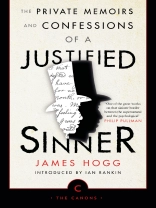It is Scotland in the early eighteenth century. Fear and superstition grip the land. Robert Wringhim, a boy of strict Calvinist upbringing, is corrupted by a shadowy figure who calls himself Gil-Martin. Under his influence Robert commits a series of murders which he regards as ‘justified’ by God under the tenets of his faith.
Hogg’s masterpiece is a brilliant portrayal of the power of evil and a scathing critique of organised religion. Superbly crafted and deftly executed, it resists any easy explanation of events: is this stranger a figment of Robert’s imagination, or the devil himself?
लेखक के बारे में
James Hogg (1770-1835) was born near Selkirk in the Scottish Borders. From a young age he was determined to be a poet like Burns. He became friends with Walter Scott and in 1810 he went to Edinburgh to seek a literary career. His most well-known work, The Private Memoirs and Confessions of a Justified Sinner, made little impact when it first appeared (anonymously) in 1824, but has since won critical interest and attention as a classic of the Scottish canon. He continued to publish poetry and prose until his death in 1835.












